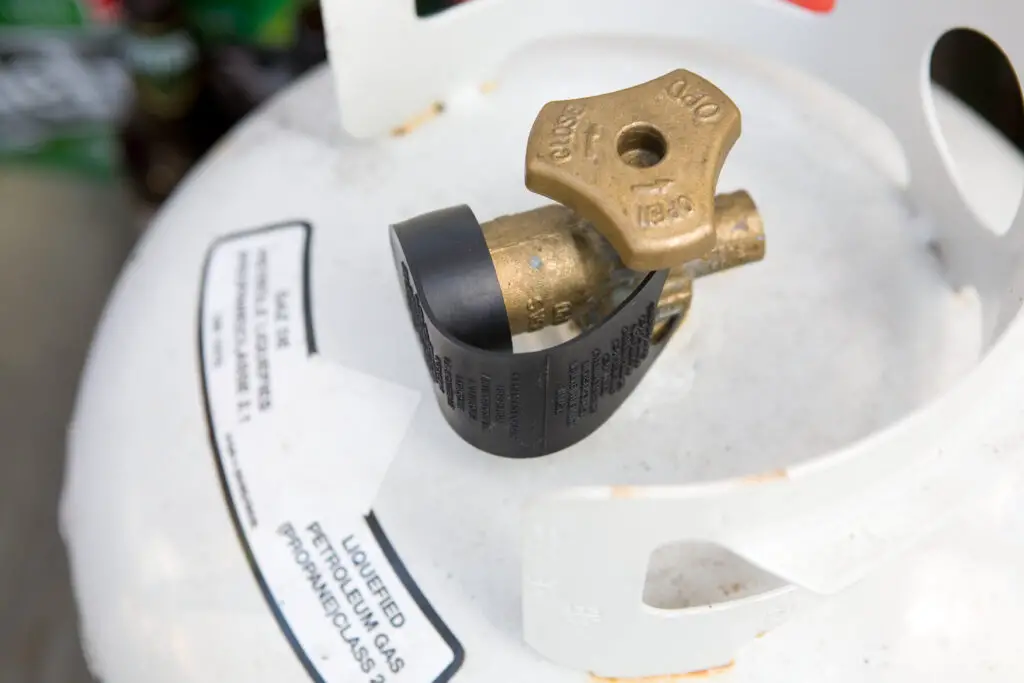Propane tanks are a convenient and efficient way to fuel outdoor appliances and devices, such as grills, heaters, and fire pits. However, because propane is a flammable gas, it’s important to store your propane tanks properly to prevent accidents and ensure the safety of your home and family.
If you’re like me, you may have just left your propane tank attached to your grill next to your home when not in use, especially during the winter months. You may have also considered storing your propane tank in your garage when not in use, but a propane tank can quickly become dangerous if stored improperly. Here are some basic tips for storing propane tanks that have helped me, especially at the end of the summer when I stop grilling out so frequently.
Propane tanks should be stored:
- in an upright position
- outside way from house or other buildings
- in a well ventilated area
- away from heat sources
- ensure that it is secure (in order to prevent being knocked over)

Propane tank storage guidelines:
- Keep propane tanks upright – Propane tanks should always be stored in an upright position. This will prevent the gas from leaking out of the tank and prevent the tank from becoming unstable and tipping over. It’s also important to ensure that the valve on the tank is closed when the tank is not in use.
Propane tanks are designed to be stored with the valve and pressure relief device at the top. This allows the gas to flow out of the tank in a controlled manner and helps to prevent accidents. - Store propane tanks outside – Propane tanks should be stored outside, away from the house and any other buildings on your property in case there is an accident with the tank causing a fire. Ideally, the tank should be stored on a level, stable surface, such as a concrete pad or a platform specifically designed for storing propane tanks.
- Choose a well-ventilated area – Propane tanks should be stored in a well ventilated area to ensure that the gas can dissipate safely. This means avoiding areas that are enclosed or covered, such as sheds or garages.
Propane is a heavier-than-air gas, which means that it will settle at the lowest level of an enclosed space. If a propane tank is stored in an enclosed area, the gas can accumulate and potentially reach a level where it can ignite and cause a fire or explosion. - Keep propane tanks away from heat sources – Propane tanks should be stored away from heat sources, such as grills, heaters, and hot water tanks. Propane is a highly flammable gas, and it can ignite if it comes into contact with a heat source or an open flame.
- Follow the manufacturer’s instructions – Each propane tank is different, so it’s important to follow the manufacturer’s instructions for storing and handling the tank. This may include specific requirements for the location, orientation, and ventilation of the tank.
- Store propane tanks securely – Propane tanks should be stored securely to prevent them from being knocked over or damaged. This may involve using straps or brackets to secure the tank in place, or storing the tank in a protective case or cage.
- Check for leaks regularly – Propane tanks should be checked for leaks regularly to ensure that the gas is not escaping from the tank. This can be done by applying a soapy water solution to check for bubbles around the tank’s fittings and valves. If you notice any leaks, the tank should not be used and should be repaired or replaced immediately.
In addition to these guidelines, it’s important to follow all local and state regulations for storing propane tanks at home. In some areas, there may be specific requirements for the distance that propane tanks must be kept from buildings, or for the type of enclosure that must be used to store the tanks.
How long does a propane tank last?
The amount of time that a propane tank will last depends on a few factors, including the size of the tank, the rate at which the propane is used, and the ambient temperature.
In general, a small propane tank (such as a tank for a portable grill) will last for about 5-6 hours of continuous use, while a larger tank (such as a tank for a home heating system) can last for several weeks or more.
To determine the approximate lifespan of a propane tank, you can use the following formula:
Tank lifespan (in hours) = Tank size (in gallons) / Propane consumption rate (in gallons per hour)
For example, if you have a 20-gallon propane tank and your grill uses 1 gallon of propane per hour, your tank will last for about 20 hours of continuous use.
It’s important to note that this is just a rough estimate, and the actual lifespan of a propane tank can vary depending on factors such as the ambient temperature and the efficiency of the appliance or device that is using the propane.
Additionally, propane tanks can lose some of their gas over time due to evaporation and other factors, so the tank may not last as long as calculated by the formula above.
To maximize the lifespan of your propane tank, you can follow a few simple tips:
- Store your propane tank in a cool, shaded area to reduce evaporation and extend the tank’s lifespan.
- Check the level of your propane tank regularly and refill or replace it before it runs completely empty.
- Avoid overfilling your propane tank, as this can cause the gas to expand and potentially rupture the tank.
- Use a protective cover or cage to keep your propane tank safe from damage.
By following these tips, you can help to extend the lifespan of your propane tank and ensure that it is stored safely and efficiently.
